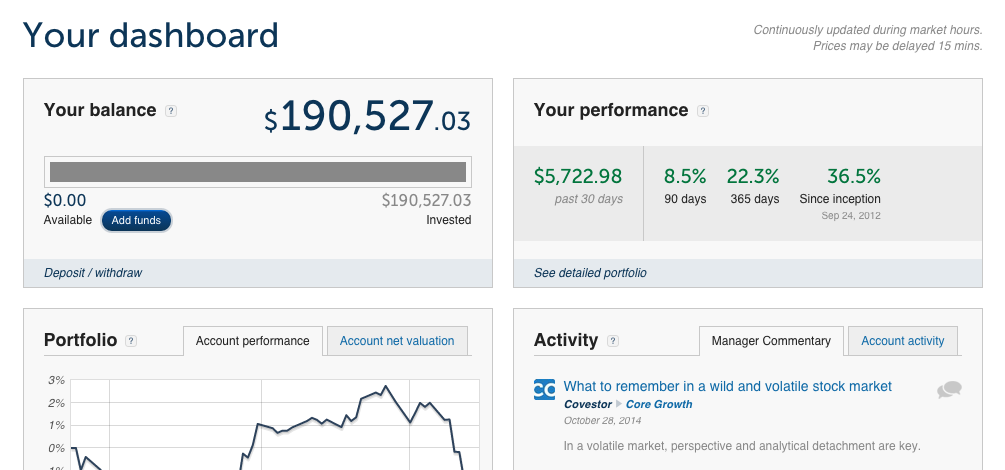 Ben Wong is one of our newest model managers. He is a U.S. Marine who has served since 2006 as a Ground Radio Repairman in Okinama, Japan and has recently completed a tour of Afghanistan. While in the military, Ben says that he’s expanded upon his technical skills through hands-on experience with hardware, computer technology and satellite communication. He brings that experience to Covestor’s Tactical and Opportunistic model, which is biased toward the technology sector. The model is
Ben Wong is one of our newest model managers. He is a U.S. Marine who has served since 2006 as a Ground Radio Repairman in Okinama, Japan and has recently completed a tour of Afghanistan. While in the military, Ben says that he’s expanded upon his technical skills through hands-on experience with hardware, computer technology and satellite communication. He brings that experience to Covestor’s Tactical and Opportunistic model, which is biased toward the technology sector. The model is
generally opportunistic, using a variety of strategies including momentum trading, charting analysis and fundamental analysis. The model will own primarily stocks but will diversify using in ETFs in order to gain exposure to foreign markets, currencies and commodities.
We recently had a chance to ask Ben some questions about his unique background and how that affects his investments:
Q. How did you get started in investing?
Ben: I have been investing for about 5 years now. My dad started me off by taking me down to a Charles Schwab branch and forcing me to put some money in mutual funds. I wasn’t satisfied with the returns I was getting, and decided to be more hands on. Over the years I’ve been gaining experience through trial and error and self study.
Q. How did your experience in Afghanistan impact your investment process?
Ben: It’s just not my experience in Afghanistan, but my overall experience in the military that affects the way I think and invest. There is a different mindset that comes from all the training, deployments and operations that go on everyday. Here are just two of the things I learned while in service that I try to apply when I invest:
1. In the military there are references for everything. It’s usually written down as an order, directive, manual, or reference. It amazes me how there’s a reference for everything – from the smallest details of how big words should be on a sign, to enormous tasks like troop movements. What I learned from being in this kind of environment is attention to detail and the importance of structure. There is a structure and logic that go behind every plan before it gets executed.
I try to apply these same principles when I invest. I appreciate that Covestor asks model mangers to write a little bit about why they bought a stock or how a particular stock fits with the manager’s current strategy. I think having structure and writing down a plan is important to investing.
2. Wrong choices, mistakes, bad decisions and investments happen. What is important is how that problem is handled and resolved. Keeping a calm head and not letting emotions run amok allows me to focus on the actual facts and act rationally. Many times an operation might be not run as planned. The ability to adapt to different conditions while keeping a rational mind is an important aspect of investing.
An example of this is when I was in Afghanistan, a patrol of infantry guys came back upset and angry. I later found out a few members of their platoon got killed in an attack. These guys had every right to be mad and seek retribution. But they took the time to cool down and grieve and adhered to the rules of engagement.
Q. I see you held – and have since sold – a position in American Capital Agency Corp (NASDAQ: AGNC), a REIT that specializes in mortgage pass-through securities and CMOs. Could you share your reasons for holding that?
Ben: I had a big position in AGNC for a few months. What caught my eye was the dividend yield which stood around 18-19% annually in May. I am always wary of REITs. Through past experiences, I found that some are overleveraged and have poor management. REITs in general seemed popular before the 2008 market and housing crash. AGNC is a bit different. Yes, the firm is very leveraged, but that is at a time when interest rates are at a historical low. AGNC invests in residential mortgage securities and collateralized mortgage obligations, many of which are guaranteed by Fannie Mae and Freddie Mac.
I sold it because it was nearing its 52 week high and I had already collected the dividend. I’m considering getting back in it at a lower price. However, with the end of QE2 and no QE3 in sight, I’m worried about interest rates rising, which could affect AGNC negatively. I will have to wait and consider market direction and conditions before reinvesting in AGNC.
Thanks, Ben. Look forward to catching up again soon.
Ben: My pleasure.

